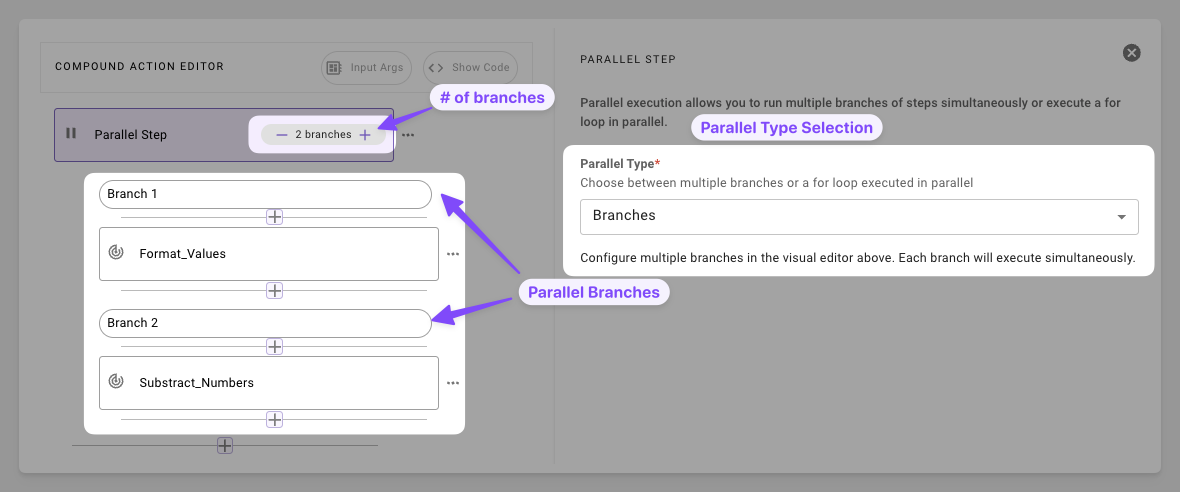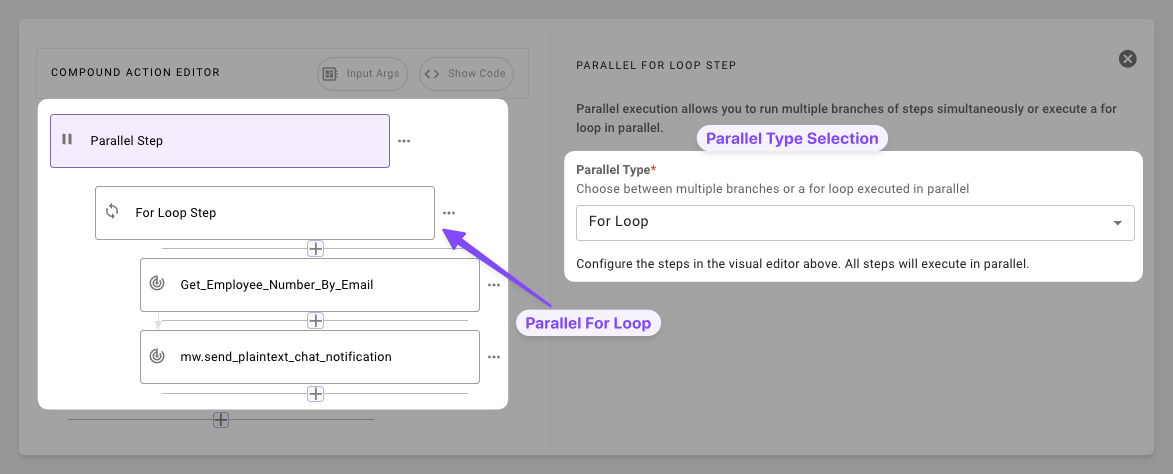Parallel
Overview
The Parallel expression allows you to run sets of expressions at the same time concurrently. It is able to spawn branches or use a for expression within in.
There are two types of parallel expressions:
- Parallel with Branches
- Parallel with For Loop
Parallel with Branches
A parallel with branches is useful when you need to run a specific number of expressions simultaneously, each with their own set of actions. The number of branches for this type of parallel does not change dynamically, it's fixed.
Parallel with For Loop
A parallel with for loop will run every expression, similar to a regular For Loop expression. However, it will run all iterations at the same time for every item in the list.
Low-Code Editor
Add a Parallel Step, select the type of parallel you need. If you select branches, you will add as many branches as you need for parallel executions of expressions. If you select for loop, bind the iterable, define loops variables, and execute iterations in parallel.

- Select Branches: For static execution of paths
- Set the amount of branches: Define how many tasks to run in parallel
- Define expressions: Add expressions under each branch

- Select For Loop: To iterate over a list of items in parallel
- Set up For variables: Set up all bindings as shown in For Loop
- Define expressions: Add expressions under the For Loop.
Syntax Reference
Schema
Parallel with Branches
parallel:
branches: # List of parallel paths (at least 2)
- steps: # Branch 1 expressions
- EXPRESSION_1 # e.g., action with output_key
- steps: # Branch 2
- EXPRESSION_2
# Optional: More branches...Parallel with For Loop
parallel:
for:
each: ITEM_VAR* # str: Per-iteration binder (e.g., 'user_id')
index: INDEX_VAR* # str: Optional position (e.g., 'idx')
in: DATA_BANK_ITERABLE* # str: Array ref (e.g., 'data.user_ids')
output_key: RESULTS_VAR*
steps: # Per-iteration expressions (parallel across iterations)
- EXPRESSION_1Fields
| Field | Type | Mandatory | Description | Mode |
|---|---|---|---|---|
branches | list[steps] | Yes (if Branches) | Step groups | Branches |
each | string | Yes (if For) | item binder - accessed as var.prop within steps | For Loop |
index | string | No | Index binder - provides position (e.g., idx) | For Loop |
in | string | Yes (if For) | Data bank reference only (upstream outputs) | For Loop |
output_key | list[dict] | Yes (if For) | List of per-iteration dicts: [ {step_key: val}, ... ]. Access: data.results[i].step_key. | For Loop |
steps | list[expr] | No | Parallelized per item | For Loop |
Practical Examples
Parallel with Branches
Example 1: Independent Notifications (Basic Fan-Out)
Log an event and send an email concurrently
parallel:
branches:
- steps:
- action:
action_name: log_event
input_args:
event_name: '''user_login'''
output_key: log_result
- steps:
- action:
action_name: send_email
input_args:
email: meta_info.user.email_addr
subject: "Login Success"
body: "Welcome back!"
output_key: email_resultExample 2: Multi-Service Sync
Update a CRM and Slack concurrently
parallel:
branches:
- steps:
- action:
action_name: update_crm
input_args:
user_id: data.user_id
output_key: crm_update
- steps:
- action:
action_name: post_slack
input_args:
channel: '''#updates'''
output_key: slack_postParallel with For Loop
Send Messages in Parallel
Run actions for each in a list in parallel
steps:
- action:
action_name: mw.batch_get_users_by_email
output_key: user_results
input_args:
user_emails:
- '"[email protected]"'
- '"[email protected]"'
- '"[email protected]"'
- parallel:
for:
each: user
index: user_index
in: data.user_results.user_records # From upstream fetch
output_key: requested_for_notifications
steps:
- action:
action_name: mw.send_plaintext_chat_notification
output_key: notification_output
input_args:
user_record_id: user.lookup_id
message: '''Hi, this is a batch message!'''Parallel Ticket Updates
Sample input argument
outage_tickets: [ {"id": "T1"}, {"id": "T2"} ]Compound Action
parallel:
for:
each: ticket
index: ticket_index
in: data.outage_tickets
output_key: updated_tickets
steps:
- action:
action_name: update_ticket_status
input_args:
ticket_id: ticket.id
status: '''ON_CALL'''
output_key: update_result
- action: # Nested parallel-friendly
action_name: notify_owner
input_args:
ticket_id: ticket.id
output_key: notify_resultExpected Output
updated_tickets: [
{
"update_result": { "id": "T1", "status": "ON_CALL" },
"notify_result": { "sent": true }
},
{
"update_result": { "id": "T2", "status": "ON_CALL" },
"notify_result": { "sent": true }
}
]Updated 3 days ago